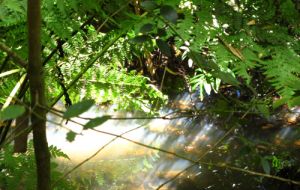MercoPress. South Atlantic News Agency
Chile preparing forest restoration plan for ravaged areas of Torres del Paine Park
 Greenhouses should produce 200,000 plants a year
Greenhouses should produce 200,000 plants a year As emergency workers finish extinguishing the last traces of fire in Torres del Paine National Park, now the Chilean government is beginning to look at the next critical phase in handling the disaster in Chile’s world-famous adventure destination.
Chile’s National Forestry Corporation (CONAF) is in the process of putting together a restoration plan which will attempt to reforest the sections destroyed by wildfire.
A swiftly devised and executed recovery strategy is vital as failure to do so could result in further ecological damage.
“When winter comes, if the ground is left without topsoil it can heavily increase erosion making it difficult to recover,” Sergio Donoso, a professor at the Universidad de Chile and president of the non-profit Association of Forest Engineers, told El Mercurio.
Forestation experts will use the aftermath of the 2005 forest fire in Torres del Paine as a reference point while formulating a course of action.
They predict that April will be a key month, as it proved to be the most productive for the collection of beech tree seedlings. The beech tree forests were most heavily impacted by the fires, with some of the trees destroyed being up 300 years old.
Once collected, the seeds will be taken to Puerto Natales some 90 miles away and planted in four greenhouses. These greenhouses are unlike others in the area and were built to withstand powerful winds of 90mi/h along with the weight of heavy snowfall on the roof.
Through the National Youth Institutes (INJUV) plea for help, over 10,000 volunteers have already signed up to help with the program.
These greenhouses combined have the ability to produce 200,000 plants a year. Based on information from the 2005 fire, it is estimated it will take a decade of planting to replace the fauna.
The efficiency of the park’s rehabilitation will depend greatly on local and foreign political support.
“Clearly if we had one or two more greenhouses we could significantly reduce the time required for the process,” Eduardo Katz, CONAF’s manager of national forests, told El Mercurio.
Meanwhile, the Israeli government has refused to offer compensation to Chile following the arrest of an Israeli citizen who authorities believe is responsible for the fire. Chilean authorities arrested and charged Rotem Singer in late December for allegedly starting the fire. Singer, 23, has denied the accusation and is fighting the charges in court.
Israel has however offered the assistance of several forestry experts.
The 2005 fire for which a Czech tourist was charged with causing it, saw the Czech government pay Chile 144,400 Euros along with assistance with the rehabilitation.
Whether or not Israel should provide financial compensation to Chile will continue to be a topic of debate.
“When someone commits a crime in a foreign country against a heritage site, his country is morally and legally obligated to compensate for the heavy damage,” Alejandro Navarro, head of the Chilean Senate’s Environment Committee, told Ynet News.
Singer has yet to be convicted for his alleged role in starting the fire.
By Nick Lavars – The Santiago Times
Greenhouses should produce 200,000 plants a year




Top Comments
Disclaimer & comment rules-

Read all commentsWhen the Czech citizen started the fire, he confessed to his negligence and his government to date has made huge contributions to the restoration effort. When an Israeli citizen loses control of his rubbish fire, not only does he deny it, so but so do his relatives and his government, stating that he was more than a mile away when the fire spontaneously started. Must have been spontaneous ignition of the Star of Dave.
Jan 11th, 2012 - 02:34 am 0Commenting for this story is now closed.
If you have a Facebook account, become a fan and comment on our Facebook Page!